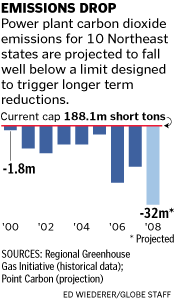The reduction in emissions came with another drawback: It has the unintended effect of delaying a longer-term and potentially more important effort to reduce greenhouse gases over the next decade.
The initiative sets a cap on carbon emissions that is designed to slowly fall over time.
The complex arrangement, called a "cap and trade" plan, works like this: Power plants obtain emission allowances from states for every ton of carbon dioxide they emit, with plants that emit larger amounts having to obtain more allowances than cleaner ones. As the cap is reduced, there are fewer available allowances, pushing the price up and thus encouraging the dirtiest power plants to instead invest in cleaner technologies. Over time, cleaner power plants will then out-compete dirtier ones.
But with emissions now about 17 percent below the cap, allowances are not in particular demand, so market forces are not kicking in. Emission allowances are not expected to get high enough anytime soon to spark investment in clean energy.
That lesson is an important one for the Obama administration as it crafts its own "cap and trade" program designed to reduce the nation's greenhouse gas emissions. If the cap is set too high, little happens. Continued...
